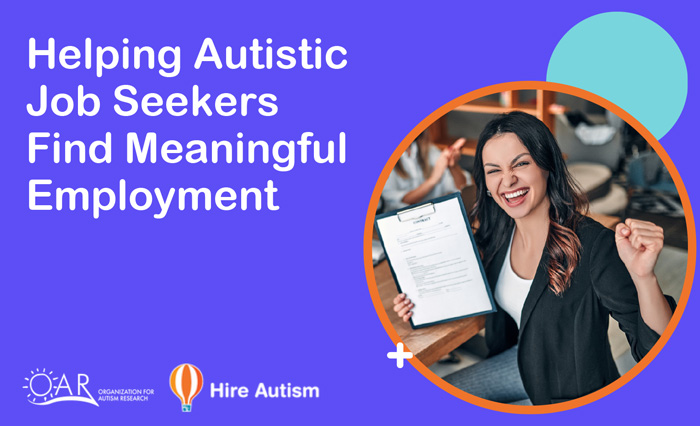When it comes to job search and employment, autistic adults may face specific challenges, including difficulties with social interactions, executive functioning, and communication. Additional obstacles include employer bias and a lack of understanding. These issues create significant barriers to finding and maintaining employment and advancing within a chosen career path.
Job search mentorship for autistic adults is an incredibly valuable and often underexplored avenue for fostering success. Autistic individuals bring unique strengths and perspectives to the workplace, and mentorship can provide the support and guidance necessary to navigate challenges, capitalize on assets, and prepare them to thrive in professional settings.
Other numerous benefits of mentorship for autistic job seekers include:
- Enhanced job search materials
- Clarification on career goals: short-term and long-term
- Networking skills and growth of the professional network
- Sense of determination and independence in the job search
- Heightened confidence
- Increased self-advocacy and communication skills
Support and Guidance
Mentorship provides autistic adults with personalized support and guidance tailored to their unique needs and goals, regardless of where they are in their job search. This may include updating job search materials, navigating job descriptions, and preparing for interviews.
Mentors can also support goal identification, an important beginning step for autistic job seekers. This guidance can help autistic individuals identify their career goals and develop practical strategies for achieving them. A clear roadmap allows candidates to find and apply for job opportunities more closely aligned with their education, experience, and skills. Additionally, mentors can clarify the education, training, and networking opportunities available to support the candidate’s long-term goals and career advancement.
An additional support component includes helping candidates identify necessary interview or job accommodations and practicing disclosure to the employer. The ability to understand and ask for accommodations is a great step to growing confidence and advocacy skills.
Confidence and Self-Advocacy
Providing autistic job seekers with this one-on-one support not only helps them understand the job search but also helps them build confidence in their ability to obtain and carry out employment. Mentors can help autistic individuals recognize their strengths and worth, celebrate their successes, and advocate for their needs. By providing encouragement and positive reinforcement, mentors empower autistic adults to believe in themselves and their abilities. Increased self-confidence has direct implications on their performance in the workplace and how they self-advocate.
Self-advocacy is a critical skill in the workplace, defined by the University of California Santa Cruz as “an individual’s ability to effectively communicate, convey, negotiate, or assert his or her own interests, desires, needs, and rights. It involves making informed decisions and taking responsibility for those decisions.” While certain aspects of self-advocacy in the job search and workplace may be daunting, such as differing communication styles, navigating social situations or norms, or asking for support, the outcomes are beneficial. Mentors can help empower job seekers to advocate for accommodations and communicate their needs to an employer to support their success. Additionally, mentors can assist job seekers in understanding common intricacies of the workplace and develop strategies for managing sensory sensitivities and communicating effectively with colleagues.
Self-advocacy is not easy; it requires practice and self-reflection. Through mentorship, autistic candidates can advocate for themselves in big and small ways. For example, they propose the time and day for their scheduled calls with their mentor, request feedback before meetings, ask questions, clarify their learning preferences, etc. In turn, this grows their confidence in self-advocacy and helps them see the positive outcomes that can occur when they express their needs.
Long-Term Implications and Networking
Mentorship can also facilitate professional development for autistic adults by providing access to networking opportunities. Mentors can introduce mentees to influential contacts, connect them with peers and professionals in their field, or share job openings they think might be a good fit. Over time, these connections and relationships can open doors to new career opportunities, collaborations, and professional growth.
In summary, mentorship for employment among autistic adults is a valuable resource that provides tailored support, builds confidence and self-advocacy skills, helps navigate the workplace, fosters skill development and career advancement, and offers long-term support and networking opportunities. By harnessing the power of mentorship, autistic adults can overcome barriers to employment and thrive in the professional world.
Hire Autism Navigator Program
The Organization for Autism Research’s (OAR) Hire Autism Navigator program is a unique mentorship program specifically designed to help autistic job seekers find meaningful employment. Navigators serve as trusted advisors and advocates, offering guidance and encouragement as mentees navigate the job search.
Through the Navigator program, OAR offers job seekers the opportunity to work with a virtual mentor on various aspects of the job search, including resume, cover letter, and interview preparation. The mentor can also provide additional resources and answers to employment-related questions such as disclosure, accommodations, and job identification.
As members of their mentee’s village of support, Navigators meet job seekers where they are in their job search and provide a do-it-yourself teaching style to continuously promote learning and self-advocacy.
Mike G., a previous Hire Autism job seeker, shared his experience with a Navigator, saying, “My Navigator helped me with my resume, interviewing skills, choosing the right jobs to apply to, and provided resources to continue guiding me through the job search. Going through the navigator program has significantly increased my confidence in myself and how to present myself and my skills to employers. It has removed much of the mystery around different aspects of job seeking. I feel well prepared for interviews and am confident my resume will stand out.”
Interested in working with a free Hire Autism Navigator? Follow these steps to get started!
Interested in volunteering as a Hire Autism Navigator? Apply now!
Courtney Carroll is Manager at Hire Autism with the Organization for Autism Research.
Reference
Empowering Success: The Art of Self Advocacy in the Workplace





